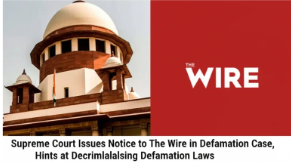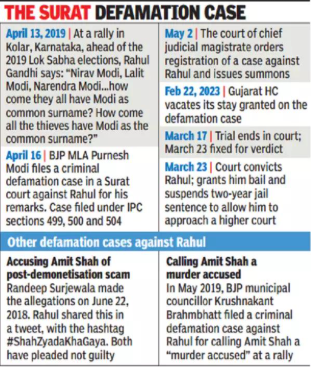Supreme Court on Decriminalisation of Defamation Introduction
- The Supreme Court recently expressed concern over the growing use of criminal defamation, observing that “the time has come” to consider decriminalising the colonial-era law.
- The Supreme Court was hearing a petition against the summons issued to the online news portal The Wire in a defamation case filed by JNU professor Amita Singh. Acting on a plea submitted by the Foundation for Independent Journalism, which operates The Wire, the court has issued a notice to the professor.
- Criminal defamation laws in India have increasingly been criticised as tools of intimidation and political propaganda, curbing open debate and undermining democratic values. While meant to protect individual reputation, their misuse has raised serious concerns about free expression, judicial overreach, and the chilling effect on public discourse.

Judicial Position on Criminal Defamation
- Subramanian Swamy Case (2016): In Subramanian Swamy v. Union of India (2016), the Supreme Court upheld the constitutional validity of criminal defamation, arguing that reputation is an intrinsic part of the right to life under Article 21. The judgment maintained that protecting one’s reputation justified reasonable restrictions on free speech under Article 19(2).
- Justice M.M. Sundresh’s Observation (2023): On September 22, 2023, Justice M.M. Sundresh highlighted growing judicial unease about the misuse of these provisions. He pointed out that private individuals increasingly exploit criminal defamation laws as weapons of harassment, rather than as genuine safeguards for reputation.
What is Criminal Defamation?
- Defamation involves publishing a statement without lawful justification that injures another’s reputation by subjecting them to hatred, ridicule, or contempt.
- Section 356 of the Bharatiya Nyaya Sanhita (BNS) criminalises defamation. It replaced Section 499, the earlier provision for criminal defamation, under the Indian Penal Code (IPC).
- Criminal defamation in the BNS is defined as an “imputation concerning any person intending to harm, or knowing or having reason to believe that such imputation will harm, the reputation of such person” through “words either spoken or intended to be read, or by signs or by visible representations, makes or publishes in any manner”.
What Is The Difference Between Civil And Criminal Defamation?
- Civil Defamation:
- Treated as a private wrong under civil law.
- Remedy is usually through monetary compensation for the damage caused to an individual’s reputation.
- Truth of a statement serves as an absolute defence.
- Criminal Defamation
- Considered a public offence under criminal law.
- Punishable with fine or imprisonment to deter malicious harm to reputation.
- For liability, three conditions must be met:
- The statement must be defamatory.
- It must target a person or a clearly identifiable group.
- It must be communicated to at least one person other than the claimant.
- Requires proof of intention to harm or knowledge that harm was likely.
- Truth is a defence only if the statement is made for the public good.
- Judicial Reasoning:
- Courts link reputation to the right to life and personal liberty under Article 21.
- Damage to reputation is thus treated as a matter affecting social harmony, not just an individual grievance.
- Criticism of Criminal Defamation:
- The law has been criticised for being too broad.
- Journalists, activists, and politicians argue it is often misused to harass and silence critics.
- Creates a chilling effect on free speech by discouraging open discussion and criticism.
Key Issues with India’s Criminal Defamation Law
- Tool of Intimidation and Self-Censorship: The fear of arrest, trial, and imprisonment creates a chilling effect on free expression. Journalists, activists, and academics often practice self-censorship to avoid the risks of litigation, undermining democratic debate and accountability.
- Procedural Weakness in Lower Courts: Trial courts often issue summons without carefully assessing whether the speech truly meets the threshold of defamation. This leads to frivolous or politically motivated cases burdening both the judiciary and the accused.
- Opportunistic Litigation and Propaganda Use: Defamation complaints are sometimes filed using statements taken out of context or deliberately distorted. Such opportunistic litigation transforms criminal defamation into a tool of propaganda rather than a legitimate protection of reputation.
- Disproportionate Punishment: India’s criminal defamation law allows imprisonment for speech that injures reputation. This punishment is widely criticised as excessive and disproportionate compared to the actual harm caused. Globally, most democracies treat defamation as a civil wrong rather than a criminal offence.
- Misuse by Politicians and the Powerful: The law is frequently weaponised by politicians, corporations, and influential individuals to silence dissent, criticism, or investigative journalism. Instead of protecting genuine reputation, it often becomes a tool for political retribution.
- Democratic Incompatibility: At its core, criminal defamation laws clash with democratic principles of free speech and open public debate. In a society that values accountability, reputation must be protected through civil remedies like damages or injunctions, not through imprisonment.
Impact of Criminal Defamation on Journalism and Political Discourse in India
- Political Weaponisation Against Opposition: The law has also become a political weapon. Prominent leaders such as Rahul Gandhi and Shashi Tharoor have faced defamation cases, demonstrating how criminal defamation is used to silence opposition voices and discourage robust political debate.
- Chilling Effect on Free Speech: The threat of imprisonment creates a chilling effect, discouraging journalists, activists, and political leaders from engaging in legitimate criticism. Fear of prosecution fosters widespread self-censorship, weakening democratic checks and balances.
- Targeting and Harassment of Editors: Criminal defamation has frequently been used to intimidate and harass media outlets. For instance, editors of The Hindu newspaper faced multiple defamation cases during the Jayalalithaa government in Tamil Nadu, illustrating how ruling powers can selectively target the press to suppress critical coverage.
- Process as Punishment: Even when cases lack merit, the long-drawn legal process itself becomes a form of punishment. Defendants are forced to attend hearings, hire lawyers, and spend years entangled in litigation, regardless of the final outcome.
- Disproportionate Impact on Local Journalism: Small-town journalists are particularly vulnerable. The risk of arrest, coupled with the burden of travelling to distant courts, makes it extremely difficult for them to pursue investigative reporting or hold local elites accountable.
- Paralysis of Political Functioning: Criminal defamation cases against public officials often create administrative paralysis. Leaders of the Delhi government, for example, were tied up in multiple defamation cases, impairing their ability to perform official duties and deliver governance effectively.

Way Forward
- Retraction and Clarification Mechanisms: A more constructive approach involves requiring publishers or media houses to issue retractions, corrections, or public clarifications. Such remedies directly address misinformation, restoring reputational balance without the threat of imprisonment.
- Balancing Free Speech and Reputation Protection: Civil remedies help maintain a constitutional balance between Article 19(1)(a) (freedom of speech and expression) and Article 21 (right to life and reputation). They safeguard reputational interests while ensuring democratic debate and dissent are not stifled.
- International Precedents and Global Best Practices: Many democracies, including the United Kingdom, Ghana, and Sri Lanka, have abolished criminal defamation laws entirely, relying solely on civil frameworks. Their experience demonstrates that civil remedies are sufficient to deter defamation while protecting press freedom.
- Curbing Misuse and Intimidation: Civil defamation proceedings are less prone to weaponisation by powerful individuals. Unlike criminal cases, which involve police summons and threat of imprisonment, civil remedies limit intimidation tactics and encourage fairer adjudication.
- Civil Court Remedies for Reputational Harm: Instead of punitive imprisonment, civil defamation laws allow aggrieved individuals to seek monetary compensation for reputational damage. This ensures accountability while avoiding the chilling effect of criminal prosecution on free speech.
- Injunction Orders and Preventive Relief: Courts can issue injunctions or restraining orders to prevent the further publication of defamatory material. This tool provides immediate protection to the reputation of individuals without resorting to criminal sanctions.














